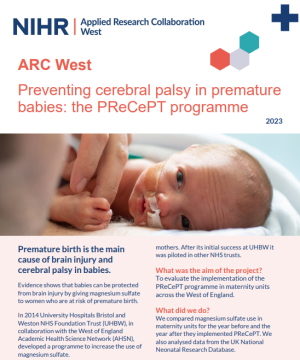Preventing cerebral palsy in premature babies: the PReCePT programme
Premature birth is the main cause of brain injury and cerebral palsy in babies. Evidence shows that babies can be protected from brain injury by giving magnesium sulfate to women who are at risk of premature birth. This medicine, costing around £5 per dose, reduces the risk of cerebral palsy by a third.
Although maternity units were giving magnesium sulfate to some mothers in premature labour, many were not being given this important treatment. In 2014 University Hospitals Bristol and Weston NHS Foundation Trust (UHBW), in collaboration with the West of England Academic Health Science Network (AHSN), developed a programme to increase the use of magnesium sulfate in the maternity unit at St Michael’s Hospital.
The programme, called PReCePT (Prevention of cerebral palsy in pre-term labour), was designed by both parents and staff. It was a ‘quality improvement’ approach. Quality improvement (QI) is a systematic, formal approach used in the NHS to analyse the performance of health services and efforts to improve them.
PReCePT provided practical tools and training to support hospital staff to give magnesium sulfate to eligible mothers. After its success at UHBW, in 2015 it was piloted in five NHS trusts across the West of England. By 2017, 64% of eligible mothers were being given magnesium sulfate across England, Scotland and Wales. However, an ARC West evaluation showed the pilot trusts significantly increased their use of magnesium sulfate from around 20% before PReCePT, to nearly 90% after. Because of this success, NHS England decided to scale-up and roll-out the PReCePT programme across all maternity units in England. It was one of seven programmes selected for adoption and spread across the national AHSN Network during 2018-2020. This work was led by the West of England AHSN.
The national PReCePT programme (NPP) was designed to support maternity units in England to increase their use of magnesium sulfate for women in premature labour (women who are less than 30 weeks pregnant). It aimed to increase use of magnesium sulfate by 2020 to 85% of eligible mothers, with a stretch target of 95% for high-performing units. NIHR ARC West also evaluated the national PReCePT programme.
Another PReCePT study, a randomised controlled trial, was nested within the national programme. The trial aimed to evaluate the best approach to scaling up PReCePT, by comparing two different support options for maternity units. Results would help inform future perinatal QI programmes. NIHR ARC West has evaluated this trial in a separate project.
What we did
We compared magnesium sulfate use in maternity units for the year before and the year after they implemented PReCePT, to measure the impact of the national programme. We also compared its use in maternity units in 2018-22, with its use in 2017.
We accounted for factors such as:
- The baby’s birth weight and how long the pregnancy lasted
- Whether it was a multiple birth (twins and triplets)
- The mother’s age, ethnicity and level of poverty
- Any relevant complications of the pregnancy
- The type of maternity unit, for example a high dependency unit or a neonatal intensive care unit
- How the use of magnesium sulfate would have likely increased over time, without the PReCePT programme
We analysed data from the UK National Neonatal Research Database. This is a reliable database with high-quality information from neonatal units across the UK.
We used this data to see if magnesium sulfate use had increased after PReCePT was introduced, and to estimate whether the programme was both effective and cost-effective.
We also investigated whether the COVID-19 pandemic affected use of magnesium sulfate.
Finally, we also looked at how magnesium sulfate was being used in Scotland and Wales, to see if what had been happening there was similar or different to what had been happening in England.
What we found and what this means
Analysis after a year of PReCePT
While use of magnesium sulfate had been increasing before, our research showed that PReCePT was able to accelerate uptake. It increased by 6.3 percentage points on average across all maternity units in England during the first year, over and above the increase that would be expected over time as the practice spread organically. After also adjusting for variations in when maternity units started the programme, the increase in use of magnesium sulfate was 9.5 percentage points. By May 2020, on average 86.4% of eligible mothers were receiving magnesium sulfate.
We also estimated that the programme’s first year could be associated with a lifetime saving to society of £3 million. This accounts for the costs of the programme, administering the treatment and of cerebral palsy to society over a lifetime, and the associated health gains of avoiding cases. This is across all the extra babies the programme helped get access to the treatment during the first year.
Analysis of four years of PReCePT
We also found that in England, magnesium sulfate use improved from about 66% in 2017 (the year before PReCePT) to about 86% in 2022 (four years after PReCePT).
After accounting for other things that might have changed over time, we estimated that PReCePT itself was responsible for about 6 percentage points (or about a third) of this total 20 percentage points improvement. The statistical analysis showed that the real amount of improvement due to PReCePT is likely to be between about 3 and 9 percentage points.
We balanced the costs of running the programme and giving magnesium sulphate against the cost-savings from preventing cerebral palsy in all the babies who had been treated. From this, we estimated that the national PReCePT programme had a ‘net monetary benefit’ of £597,000, meaning it saved more money than it costed.
The impact of the pandemic
Since the COVID-19 pandemic in 2020, it looks like magnesium sulphate use might have declined slightly. Use of antenatal steroids, another protective treatment for preterm babies, also appears to have declined the same amount since the pandemic.
The pandemic, which had a negative effect on many aspects of healthcare, could have had a similar negative effect on maternity care. This trend is concerning.
Comparing with Scotland and Wales
Comparing England with Scotland and Wales, by 2022 all three nations were at similar levels, with around 80-85% of eligible mothers being treated. However, it also seemed the PReCePT programme accelerated magnesium sulfate use in England faster than in Scotland and Wales.
What next?
There are two important studies to do next.
One is to check equity in treatment. We know that overall more mothers are being treated, but it’s important to check if all mothers have benefitted equally, or if there are any groups that we might need to work harder to treat.
The other study is to check that these improvements in treatment really have, as expected, resulted in fewer children having cerebral palsy.
We also hope to develop a prototype toolkit to support implementation of new interventions in NICE guidance. This is a vital step in helping NHS hospitals put research evidence and national clinical guidelines into practice.
Papers
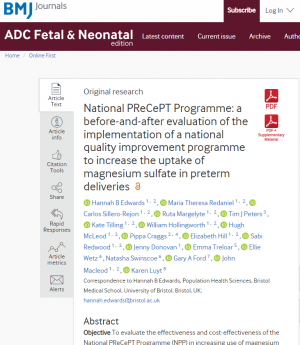
National PReCePT Programme: a before-and-after evaluation of the implementation of a national quality improvement programme to increase the uptake of magnesium sulfate in preterm deliveries
Read the paper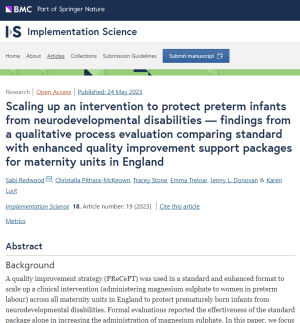
Scaling up an intervention to protect preterm infants from neurodevelopmental disabilities — findings from a qualitative process evaluation comparing standard with enhanced quality improvement support packages for maternity units in England
Read the paper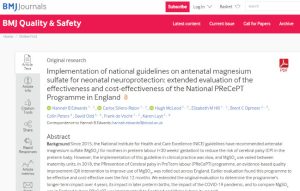
Implementation of national guidelines on antenatal magnesium sulfate for neonatal neuroprotection: extended evaluation of the effectiveness and cost-effectiveness of the National PReCePT Programme in England
Read the paper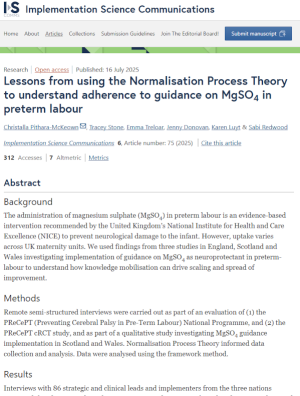
Lessons from using the Normalisation Process Theory to understand adherence to guidance on MgSO4 in preterm labour
Read the paper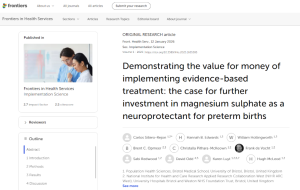
Demonstrating the value for money of implementing evidence-based treatment: the case for further investment in magnesium sulphate as a neuroprotectant for preterm births
Read the paperRelated research projects
This work is related to the following projects.
Links and downloads
- Read more on the Health Foundation's website Health Foundation's PReCePT page
- Read more on the AHSN Network's website PReCePT on the AHSN Network
- Bristol initiative prevents 200 cerebral palsy cases a year Read the BBC Bristol news coverage
- Preventing cerebral palsy in premature babies Read the NIHR Making a Difference case study
- NHS quality improvement programme reduces the risk of cerebral palsy in newborns Read the NIHR Alert
- NHS England's patient safety strategy case study of PReCePT Read the case study
Lead collaborators
- Natasha Swinscoe, Health Innovation West of England
- Ellie Wetz, Health Innovation West of England
- Tony Goring, Health Innovation West of England
ARC West Staff
Liz Hill
Research Portfolio ManagerDebbie McPhee
Information OfficerProfessor Sabi Redwood
DirectorHannah Edwards
Senior Research Associate, Quantitative ResearchDr Carlos Sillero Rejon
Research Fellow, Health EconomicsPippa Craggs
Chief Operating OfficerProfessor Will Hollingworth
Cross-cutting Methodological Theme LeadProfessor John Macleod
Professor in Clinical Epidemiology and Primary CarePartners on this project
Health Innovation West of England
Health Innovation West of England is a diverse network of partners working collaboratively to put innovation at the heart of healthcare, to improve patient outcomes and contribute to wealth creation. It aims to do this by translating research into practice, and developing and implementing integrated health care services.
University Hospitals Bristol and Weston NHS Foundation Trust
University Hospitals Bristol and Weston NHS Foundation Trust is a dynamic group of hospitals in the heart of Bristol and Weston-Super-Mare, with over 100 clinical services across ten sites. They offer care to the people of Bristol, Weston-Super-Mare and the South West, and have an international reputation for cardiac surgery, paediatric services, oncology and bone marrow transplantation. They are the largest centre for medical training and research in the South West.
University of Bristol
The University of Bristol is internationally renowned and one of the very best in the UK, due to its outstanding teaching and research, its superb facilities and highly talented students and staff. Its students thrive in a rich academic environment which is informed by world-leading research. It hosts the Elizabeth Blackwell Institute for Health Research.
